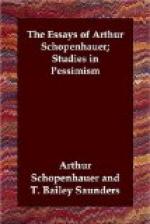[Footnote 1: Translator’s Note.—Matthias Claudius (1740-1815), a popular poet, and friend of Klopstock, Herder and Leasing. He edited the Wandsbecker Bote, in the fourth part of which appeared the treatise mentioned above. He generally wrote under the pseudonym of Asmus, and Schopenhauer often refers to him by this name.]
Between the ethics of the Greeks and the ethics of the Hindoos, there is a glaring contrast. In the one case (with the exception, it must be confessed, of Plato), the object of ethics is to enable a man to lead a happy life; in the other, it is to free and redeem him from life altogether—as is directly stated in the very first words of the Sankhya Karika.
Allied with this is the contrast between the Greek and the Christian idea of death. It is strikingly presented in a visible form on a fine antique sarcophagus in the gallery of Florence, which exhibits, in relief, the whole series of ceremonies attending a wedding in ancient times, from the formal offer to the evening when Hymen’s torch lights the happy couple home. Compare with that the Christian coffin, draped in mournful black and surmounted with a crucifix! How much significance there is in these two ways of finding comfort in death. They are opposed to each other, but each is right. The one points to the affirmation of the will to live, which remains sure of life for all time, however rapidly its forms may change. The other, in the symbol of suffering and death, points to the denial of the will to live, to redemption from this world, the domain of death and devil. And in the question between the affirmation and the denial of the will to live, Christianity is in the last resort right.
The contrast which the New Testament presents when compared with the Old, according to the ecclesiastical view of the matter, is just that existing between my ethical system and the moral philosophy of Europe. The Old Testament represents man as under the dominion of Law, in which, however, there is no redemption. The New Testament declares Law to have failed, frees man from its dominion,[1] and in its stead preaches the kingdom of grace, to be won by faith, love of neighbor and entire sacrifice of self. This is the path of redemption from the evil of the world. The spirit of the New Testament is undoubtedly asceticism, however your protestants and rationalists may twist it to suit their purpose. Asceticism is the denial of the will to live; and the transition from the Old




